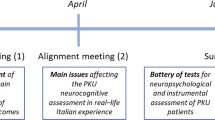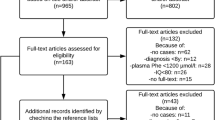Abstract
Due to the observation of severe neurological symptoms in single patients as well as brain imaging, neuropsychological and neurophysiological abnormalities, the long-term prognosis of treated phenylketonuria is still under discussion. We investigated the neurological outcome of 57 (24 male, 33 female) patients with phenylketonuria (diet onset <3 months) at a mean age of 23.6 (17–33) years in comparison to control subjects. Methods used were a clinical-neurological examination, tests for fine motor abilities, IQ test (WAIS-R), a neuropsychological attention task and MRI (30 patients only). Tremor was increased in the patients (28%) compared to controls (15%). Fine motor abilities were significantly reduced in three areas: hand-wrist steadiness, finger-hand dexterity and hand-wrist speed. Tremor as well as reduced fine motor skills were not associated with treatment-related variables, e.g. diet onset, strictness of biochemical control or amount of MRI white matter change. IQ was lower in patients (mean 97.6) compared to matched control subjects (mean 105.5). IQ at 12 years was correlated with biochemical control from birth up to the age of 12 and remained stable up to adult age, independent of biochemical control after 12 years of age. In contrast to the other outcome parameters, the performance in a neuropsychological attention task was influenced by the concurrent plasma phenylalanine concentration. Specific late-onset neurological impairment was not identified in this sample of early-treated adults with phenylketonuria.
Conclusion Careful neurological investigation revealed subtle symptoms of brain damage even after early-initiated treatment in adult patients with phenylketonuria. At present it cannot be excluded that further neurological deterioration could emerge later in life. Thus, patients with phenylketonuria – either on or off diet – should be monitored throughout life.
Similar content being viewed by others
Author information
Authors and Affiliations
Additional information
Received: 5 February 1998 / Accepted in revised form: 22 June 1998
Rights and permissions
About this article
Cite this article
Pietz, J., Dunckelmann, R., Rupp, A. et al. Neurological outcome in adult patients with early-treated phenylketonuria. Eur J Pediatr 157, 824–830 (1998). https://doi.org/10.1007/s004310050945
Issue Date:
DOI: https://doi.org/10.1007/s004310050945




